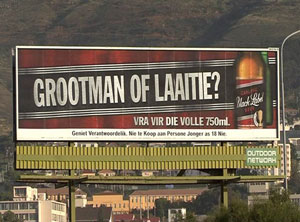South African Minister of Social Development:
“We have to be robust in reducing harm caused by alcohol"
- We are committed to using evidence-based strategies to reduce the harm caused by alcohol use and abuse. South African Minister of Social Development, Bathabile Dlamini.
 Alcohol-related problems are on the political agenda in South Africa, following a declaration of intent by the government to ban advertising on alcohol. South Africa has a relatively high level of alcohol consumption; 9.5 liters per capita 15 years and above according to the most recent WHO data. The African average is 6.2 liters. South Africa also has a substantial segment of the population with risky drinking patterns. Alcohol-related violence, the spread of HIV/AIDS and a sky-high prevalence of fetal alcohol spectrum disorders (FASD) are three areas of alcohol-related harm typical for South Africa.
Alcohol-related problems are on the political agenda in South Africa, following a declaration of intent by the government to ban advertising on alcohol. South Africa has a relatively high level of alcohol consumption; 9.5 liters per capita 15 years and above according to the most recent WHO data. The African average is 6.2 liters. South Africa also has a substantial segment of the population with risky drinking patterns. Alcohol-related violence, the spread of HIV/AIDS and a sky-high prevalence of fetal alcohol spectrum disorders (FASD) are three areas of alcohol-related harm typical for South Africa.
The alcohol and advertising industries have recently circulated a petition aimed at pressuring government to abandon its intended ban on advertising alcohol. This is one of many initiatives by the industry to push the South African government to refrain from alcohol regulations and rather focus on underlying factors driving alcohol abuse and place resources in public information and education. In an article in The Sunday Independent the Minister of Social Development, Bathabile Dlamini, comes out very strongly against the industry approach to alcohol prevention.
"Big man or whimp?" is the slogan of the billbord pictured above. The point of this is to convince "real men" to drink 750 ml bottles of beer rather than half the size bottles. This is one of many examples of aggressive marketing by the South African brewing industry. This industry is similarly active in the policy arena, both in South Africa and in many other African countries.
Read the full article in The Sunday Independent here.
The Ministers welcomes the industry’s acknowledgement of the significant negative impacts of alcohol use. “…but we are committed to using evidence-based strategies to reduce the harm caused by alcohol use and abuse”, says the Minister in her article. She continues by discussing alcohol as a product. “Beneath the fancy bottling, packaging and slick advertising linking alcoholic products to sporting prowess, business savvy and overwhelming sexiness, lies a drug called ethanol…
The drinking of ethanol in its fancy packaging has been identified as a leading risk factor for death and disability globally. Alcohol is not just another consumer product, but impacts negatively on the health of those who consume it and places an enormous strain on the health system”.
 Reference is made by Minister Dlamini (picture right) to a number of alarming statistical data linking alcohol use to murders, rape, assaults, traffic deaths and HIV/AIDS in her country. “This means we have to implement measures that will reduce exposure of young people and the general population to advertising that falsely portrays carefully packaged ethanol as being cool and successful.
Reference is made by Minister Dlamini (picture right) to a number of alarming statistical data linking alcohol use to murders, rape, assaults, traffic deaths and HIV/AIDS in her country. “This means we have to implement measures that will reduce exposure of young people and the general population to advertising that falsely portrays carefully packaged ethanol as being cool and successful.
We have to ensure that we raise the price of alcohol to make it less accessible. We have to ensure that we regulate the number of licensed outlets so that we limit access. We have to put in place measures that will raise the legal age for buying alcohol so that we can protect our youth and become very strict with regard to drink driving.
These strategies are regarded as common sense and serve as guidelines for good policy by the World Health Organisation”, concludes The Minister of Social Development in her article.
On the 14th of December the same Minister launched a national anti-alcohol and substance abuse campaign on behalf of the South African government. She called on communities across the country to step up and take the lead in the fight against drug and alcohol abuse. Dlamini along with her Deputy, Maria Ntuli, addressed hundreds of people in Khayelitsha township, outside Cape Town, on Wednesday during the launch.
A government report from the launch can be found here.
The campaign was launched in the Western Cape because the province has the largest problem of drug and substance abuse in the country, particularly the use of tik (crystal methamphetamine).
The new programme has the backing of several stakeholders, including the South African Police, religious institutions and non-profit organisations. Dlamini challenged communities to stop asking what the government was doing about the problem, but instead, to ask themselves what they could do to stop the scourge.
RELATED ARTICLES
- New report highlights benefits of policy measures to prevent harmful alcohol consumption
- Alcohol use - a barrier to health and to the achievement of the SDGs
- Government investments in alcohol industry up against the wall
- Abstracts for GAPC 2020 – deadline 29 July 2019
- Involve young people as partners in prevention!
- A regional African alcohol coordination mechanism is needed
- New book reveals a series of unethical business practices by Heineken in Africa
- Next GAPC to be held in Dublin in March 2020
- SAFER – a new WHO initiative to boost national alcohol policy processes
- Trouble Brewing

